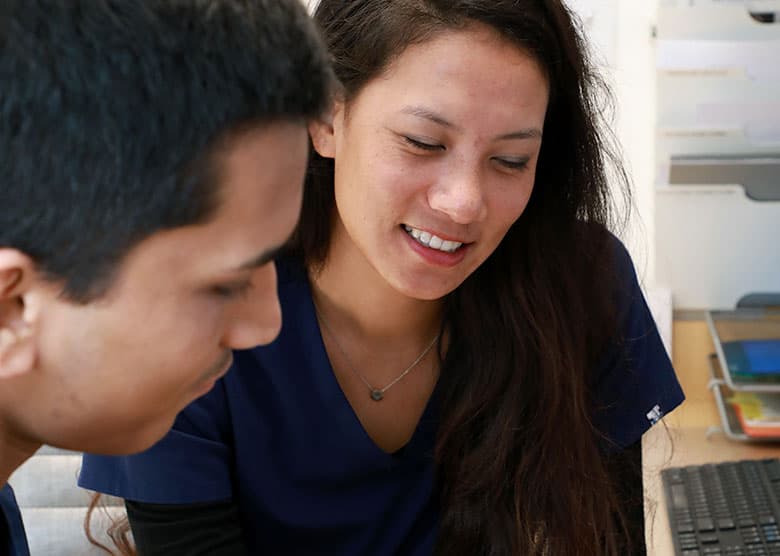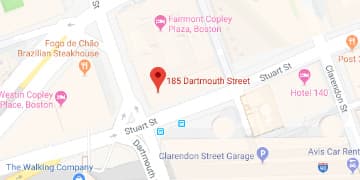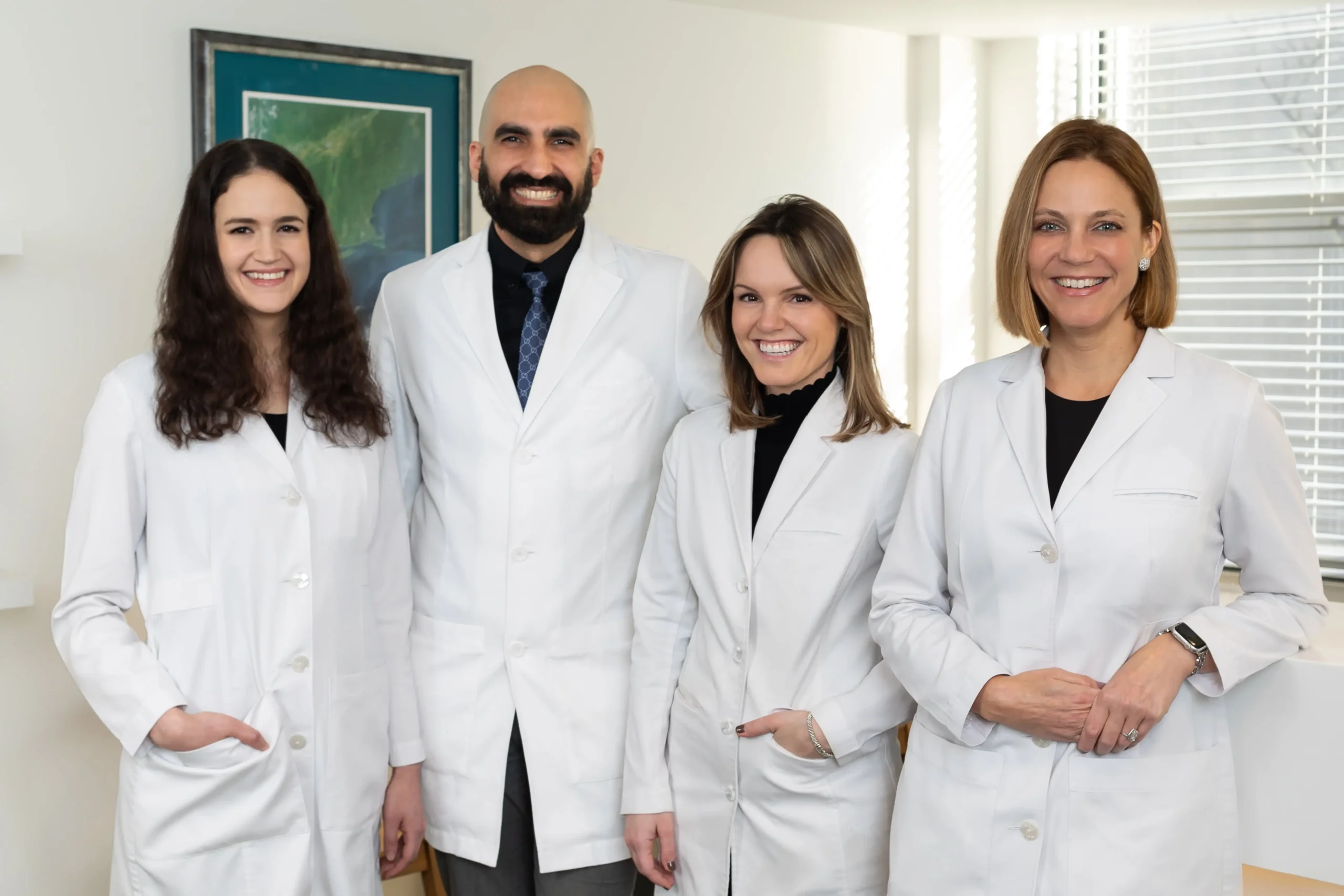Boston Alopecia Treatment
Jump To
If you’re one of the millions of people in the U.S. who struggle with hair loss, you have a type of alopecia. Alopecia can be a troubling and, at times, embarrassing condition for individuals affected by it. Fortunately, effective treatments for alopecia are available.
What is Alopecia?
Alopecia means hair loss, and it varies in severity and magnitude. Alopecia can manifest differently in everyone, with some people only suffering tiny patches of hair loss and others ending up completely bald. There are many different kinds of alopecia and it can affect both men and women of all ages. Some types of alopecia are reversible and are known as non-scarring alopecia. Other types of alopecia lead to permanent non-reversible hair loss and are called scarring alopecia. The most common kinds are alopecia areata and androgenetic alopecia, both of which we have detailed information on below.
Other types of alopecia include: telogen effluvium, cicatricial alopecia, frontal fibrosing alopecia and traction alopecia.
A complete medical evaluation may be needed to correctly diagnose which type of alopecia a patient has. A skin biopsy may be necessary and blood work may be performed to help determine the type of hair loss. Sometimes a cause can be identified but often times we do not know what triggers a person to lose their hair. In some instances, stress, illness, childbirth, or weight loss can be the culprit of hair thinning.
Many patients with hair loss suffer from anxiety and depression as a result of their hair condition. Prompt medical evaluation is important to stop or slow hair loss.
Alopecia Areata
Alopecia areata is a common form of alopecia in which the body attacks its own hair follicles, causing hair to fall out at the root and manifests as bald patches on the scalp. Alopecia can occur in men or women who are completely healthy. It is most common on the scalp, but can happen anywhere on the body, and to varying degrees.
When Does Alopecia Areata Usually Begin?
Alopecia areata can occur at any point throughout a person’s life. However, the condition most commonly arises in the pre-teen or teenage years. Warning signs won’t be as obvious in the early years, and any hair that is lost can potentially grow back. The older a person is, the less likely their hair is to grow back.
Am I at Risk of Developing Alopecia Areata?
Despite how common alopecia areata is, doctors are still trying to understand who is most at risk. We know that alopecia is an autoimmune disorder in which the body attacks its own hair follicles, but nobody knows why it happens. Some conditions that have been linked with alopecia and that are thought to increase your risk of developing it are:
- Seasonal allergies
- Down syndrome
- Asthma
- A thyroid condition
- Pernicious anemia
- Vitiligo
Genetic Links
A person is more at risk of developing alopecia if they have a family member with the condition. While alopecia isn’t contagious, genetics can increase the risk of developing the condition.
What are the Symptoms of Alopecia Areata?
The main sign of alopecia is that you start to lose your hair. However, the hair loss can occur in patches and be so gradual that you don’t even notice it. Here are a few symptoms of alopecia:
- Small bald patches on the top or sides of the head and other parts of the body
- Patches that grow together to form a single bald spot
- Regrowth of hair in certain areas and further hair loss in others
- Fairly sudden hair loss
- Brittle fingernails and toenails
What are the Treatment Options for Alopecia Areata?
While alopecia isn’t a life-threatening disease, it can be embarrassing and cause anxiety, sadness, and depression. The good news is that you no longer have to live with it. While alopecia can’t be cured entirely, treatments are available to help you regrow your hair.
Corticosteroid Injections
Corticosteroids are used to treat autoimmune diseases, of which alopecia is one. Steroids in pill, injection, or cream form can regrow your hair.
Platelet-rich Plasma
Platelet rich plasma (PRP) injection is a new, cutting-edge procedure utilizing the patient’s own blood to help regrow hair. This is a safe, effective procedure with little to no downtime.This treatment is 100% all-natural and non-invasive. The idea is to use your own plasma and biological materials to stimulate new life into your hair follicles.
Vitamins
Vitamins are one of the most common treatments for hair loss, but they’re usually used in conjunction with other remedies. Vitamins are beneficial in preventing further hair loss but don’t always help the hair grow back.
Topical Medications
Topical medications, such as Rogaine, are also great ways to prevent or slow hair loss. These are often used as a supplemental remedy, similar to vitamins.
Are There Home Remedies to Treat Alopecia Areata?
Several over-the-counter vitamins and topical medications can be used for hair loss. Reducing stress and anxiety can also have a positive impact. However, these methods take time and aren’t always effective. The best way to restore the damage caused by alopecia is to see a dermatologist.
Androgenetic Alopecia
Androgenetic alopecia is a very common type of progressive hair loss that can occur in males and females. It is often known as “male-pattern baldness” or “female-pattern baldness”.
When does androgenetic alopecia usually begin?
Androgenetic alopecia can begin in the teenage years, though this is uncommon. The frequency and severity increase with age. 80% of men and 50% of women show evidence of androgenetic alopecia by age 70.
Am I at Risk of Developing Androgenetic Alopecia?
If you have a strong family history of male-pattern baldness or female-pattern baldness, you are more susceptible to developing these types of alopecia.
What are the Symptoms of Androgenetic Alopecia?
In men, hair thinning at the temples and crown are the earliest symptoms of male androgenetic alopecia. In women, the central “part” of the hair begins to widen and thin.
How Can I Treat Androgenetic Alopecia?
Oral medications such as finasteride (for men) and spironolactone (for females) can be used to treat androgenetic alopecia.
How Can I Treat My Alopecia in Boston?
Androgenetic alopecia can also be treated with both topical and oral minoxidil. Topical minoxidil is also known as Rogaine and is available over the counter. Oral minoxidil is available by prescription only and is a very effective way to regrow hair.
If you currently have or are worried you may be developing any type of alopecia, the Dermatology Institute of Boston is here to help. We pride ourselves on our ability to treat alopecia and will opt for a treatment that you feel comfortable with. We strive to make every visit comfortable and enjoyable, ensuring the highest quality of care. If you have alopecia or another skin condition, we’re here to serve your needs.
Depending on the type of hair loss, multiple treatment options are available. Over-the-counter treatments such as minoxidil (Rogaine) can be helpful for certain types of hair loss. Other times, prescription pills such as finasteride or spironolactone may be necessary. There are some in-office procedures that can help regrow hair. Cortisone injections can be done by a health care provider to help stimulate hair growth.
Call or contact our Boston office to schedule your consultation with Dr. Graber, Dr. Meyer, or Dr. Al-Haseni.
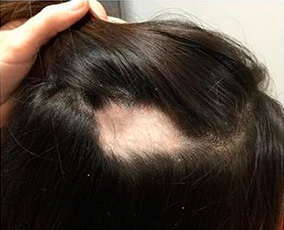
1st treatment
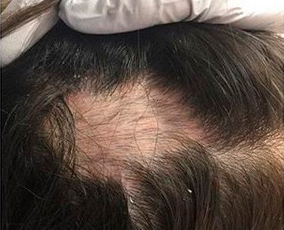
2nd treatment
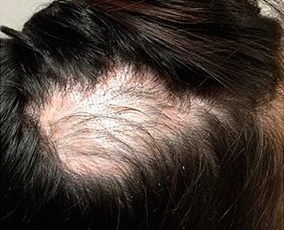
3rd treatment
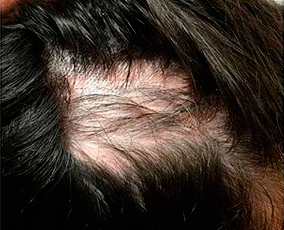
4th treatment

